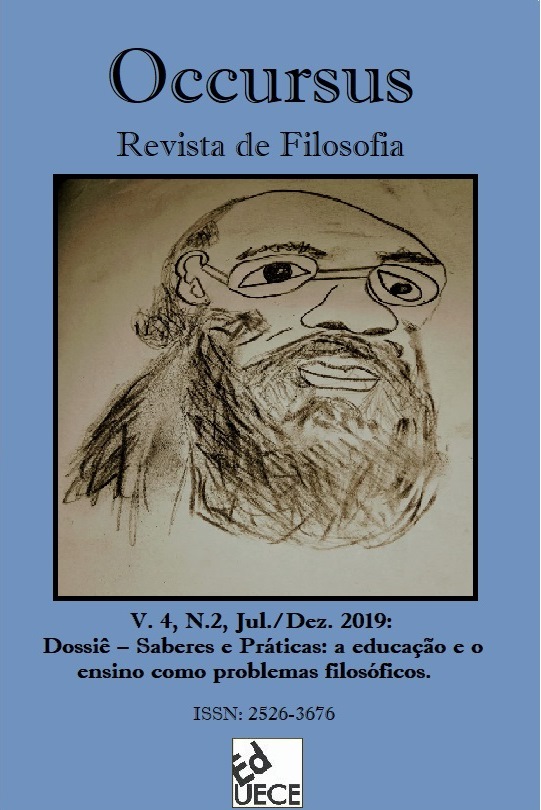O problema da educação na Filosofia prática de Benedictus de Spinoza
Palavras-chave:
Spinoza. Ética. Afetos. Filosofia. Educação.Resumo
Benedictus de Spinoza (1632-1677) não tratou sistematicamente o tema da educação nas suas obras filosóficas. No entanto, analisando suas teorias ética (liberdade), epistemológica (conhecimento) e psicológica (afeto), veremos que o autor se preocupou em alguns momentos com a educação enquanto formadora do indivíduo ativo e livre. Esta pesquisa tem como objetivo explicitar o problema da educação na ética do filósofo holandês a partir de uma abordagem ético-afetiva da educação. Ou seja, analisaremos, a partir da leitura investigativa dos textos Ética, e outros escritos como o Tratado da Reforma da Inteligência, indícios de que o pensador holandês pensou como educador. Conclui-se que, a partir dessa análise, Spinoza preocupou-se em formar e instruir os homens para serem mais potentes e livres a partir dos bons encontros, bem como, pelas experiências dos afetos ativos, como a alegria.
Referências
ABREU, L. M. de. O lugar da Pedagogia em Spinoza. In: Filosofia e Educação.Uberlândia-MG, v.5, n.1, abril, 2013, pp.8-24.
BONADIA, F. O. O espinosismo é uma forma de educação libertária? In: Educação e Pesquisa. São Paulo, v.45, 2019, pp. 1-17.
GOMES, C. W. B. O Ensino ético dos afetos em Benedictus de Spinoza. In: Revista Ideação, Bahia, n. 35, Jan./ Jun. 2017, pp. 449-480.
MERÇON, J. Aprendizado ético-afetivo: uma leitura spinozana da educação. Campinas- SP: Editora Alínea, 2009.
O desejo como essência da educação. In: Filosofia e Educação. Uberlândia- MG, v.5, n.1, abril, 2013, pp.25-51.
RABENORT, W. L. Spinoza como Educador. Tradução do Coletivo GT Benedictus de Spinoza. Fortaleza: EdUECE, 2018. (Col. Argentum Nostrum).
RAVÀ, A. A Pedagogia de Espinosa. Tradução de Fernando Bonadia de Oliveira, Emanuel Angelo da Rocha Fragoso, Homero Santiago e Kácia Natália de Barros. In: Filosofia e Educação. Campinas, v.5, n.1, abril, 2013, pp. 261-276.
SPINOZA, B. Breve Tratado. Tradução, introdução e notas: Emanuel Angelo da Rocha Fragoso e Luis César Guimarães Oliva. Belo Horizonte: Autêntica, 2012. (Coleção Filo/Espinosa).
Correspondência Completa e Vida. In: Obra Completa II. Tradução de J. Guinsburg, Newton Cunha e Roberto Romano. São Paulo: Perspectiva, 2014.
Ética. Edição bilíngue Latim-Português. Tradução: Grupo de Estudos Espinosanos. Coordenação: Marilena Chauí. São Paulo: Edusp, 2015.
Tratado da Reforma da Inteligência. Tradução, introdução e notas: Lívio Teixeira. São Paulo: Martins Fontes, 2004.
TEIXEIRA, L. A doutrina dos modos de percepção e o conceito de abstração na filosofia de Espinosa. São Paulo: Editora UNESP, 2001.
Downloads
Publicado
Como Citar
Edição
Seção
Licença
Copyright (c) 2024 Carlos Wagner Benevides Gomes

Este trabalho está licenciado sob uma licença Creative Commons Attribution 4.0 International License.




